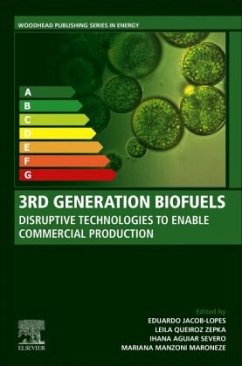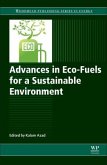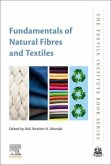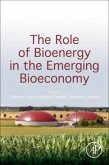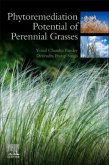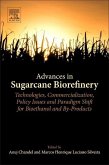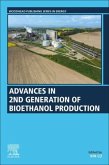3rd Generation Biofuels
Disruptive Technologies to Enable Commercial Production
Herausgegeben:Jacob-Lopes, Eduardo; Queiroz Zepka, Leila; Severo, Ihana Aguiar; Maroneze, Mariana Manzoni
3rd Generation Biofuels
Disruptive Technologies to Enable Commercial Production
Herausgegeben:Jacob-Lopes, Eduardo; Queiroz Zepka, Leila; Severo, Ihana Aguiar; Maroneze, Mariana Manzoni
- Broschiertes Buch
- Merkliste
- Auf die Merkliste
- Bewerten Bewerten
- Teilen
- Produkt teilen
- Produkterinnerung
- Produkterinnerung
3rd Generation Biofuels: Disruptive Technologies to Enable Commercial Production is a comprehensive volume on all aspects of algal biofuels, offering the latest advances on commercial implementation. In addition to the fundamentals, the book discusses all applied aspects of 3rd generation biofuels production, including design approaches, unit operations of the upstream and downstream biomass processing, and every potential microalgae-based energy product, including microbial fuel cells. Policy, economic, environmental, and regulatory issues are addressed in a dedicated section. Finally, the…mehr
Andere Kunden interessierten sich auch für
![Advances in Eco-Fuels for a Sustainable Environment Advances in Eco-Fuels for a Sustainable Environment]() Advances in Eco-Fuels for a Sustainable Environment159,99 €
Advances in Eco-Fuels for a Sustainable Environment159,99 €![Advances in Bioenergy Advances in Bioenergy]() Advances in Bioenergy144,99 €
Advances in Bioenergy144,99 €![Fundamentals of Natural Fibres and Textiles Fundamentals of Natural Fibres and Textiles]() Fundamentals of Natural Fibres and Textiles168,99 €
Fundamentals of Natural Fibres and Textiles168,99 €![The Role of Bioenergy in the Emerging Bioeconomy The Role of Bioenergy in the Emerging Bioeconomy]() The Role of Bioenergy in the Emerging Bioeconomy109,99 €
The Role of Bioenergy in the Emerging Bioeconomy109,99 €![Phytoremediation Potential of Perennial Grasses Phytoremediation Potential of Perennial Grasses]() D.P. SinghPhytoremediation Potential of Perennial Grasses87,99 €
D.P. SinghPhytoremediation Potential of Perennial Grasses87,99 €![Advances in Sugarcane Biorefinery Advances in Sugarcane Biorefinery]() Advances in Sugarcane Biorefinery105,99 €
Advances in Sugarcane Biorefinery105,99 €![Advances in 2nd Generation of Bioethanol Production Advances in 2nd Generation of Bioethanol Production]() Advances in 2nd Generation of Bioethanol Production156,99 €
Advances in 2nd Generation of Bioethanol Production156,99 €-
-
-
3rd Generation Biofuels: Disruptive Technologies to Enable Commercial Production is a comprehensive volume on all aspects of algal biofuels, offering the latest advances on commercial implementation. In addition to the fundamentals, the book discusses all applied aspects of 3rd generation biofuels production, including design approaches, unit operations of the upstream and downstream biomass processing, and every potential microalgae-based energy product, including microbial fuel cells. Policy, economic, environmental, and regulatory issues are addressed in a dedicated section. Finally, the book presents pilot and demonstration-scale projects for 3rd generation biofuels production in the format of a white paper. Each chapter reviews the state of the art, discusses the disruptive technological approaches that will potentially enable large-scale production, and concludes with specific recommendations on how to achieve commercial competitiveness.
The book provides readers with an invaluable reference for researchers, graduates, and practitioners working in the areas of renewable energy, bioenergy and alternative fuels, and biotechnology.
The book provides readers with an invaluable reference for researchers, graduates, and practitioners working in the areas of renewable energy, bioenergy and alternative fuels, and biotechnology.
Produktdetails
- Produktdetails
- Woodhead Publishing Series in Energy
- Verlag: Elsevier Science & Technology / Woodhead Publishing
- Artikelnr. des Verlages: C2020-0-02030-X
- Englisch
- Abmessung: 53mm x 152mm x 229mm
- Gewicht: 1840g
- ISBN-13: 9780323909716
- Artikelnr.: 62756672
- Herstellerkennzeichnung Die Herstellerinformationen sind derzeit nicht verfügbar.
- Woodhead Publishing Series in Energy
- Verlag: Elsevier Science & Technology / Woodhead Publishing
- Artikelnr. des Verlages: C2020-0-02030-X
- Englisch
- Abmessung: 53mm x 152mm x 229mm
- Gewicht: 1840g
- ISBN-13: 9780323909716
- Artikelnr.: 62756672
- Herstellerkennzeichnung Die Herstellerinformationen sind derzeit nicht verfügbar.
Prof. Eduardo Jacob-Lopes is currently associate professor at the Department of Food Technology and Science, Federal University of Santa Maria, Brazil. He has more than 18 years of teaching and research experience. He is a technical and scientific consultant of several companies, agencies, and scientific journals. He has more than 600 publications/communications and has registered 15 patents. His research interest includes biotechnology and bioengineering with emphasis on microalgal biotechnology.
Dr. Leila Queiroz Zepka is currently an Associate professor at the Department of Food Technology and Science, Federal University of Santa Maria (UFSM). She has more than 15 years of teaching and research experience. She has published more than 500 scientific publications/communications, which include 10 books, 50 book chapters, 100 original research papers, 350 research communications in national and international conferences, and 12 patents. She is a member of the editorial board of 5 journals and acts as a reviewer for several national and international journals. Her research interest includes microalgal biotechnology with an emphasis on microalgae-based products.
Dr. Ihana Aguiar Severo is currently a researcher at the Sustainable Energy Research and Development Center (NPDEAS), Federal University of Paraná, Brazil. She has published more than 60 scientific publications/communications, which include book chapters, original research papers, research communications in national and international conferences, and patents. She acts as a reviewer for several international journals. Her research interests include microalgae-based processes and products with an emphasis on process integration.
Dr. Leila Queiroz Zepka is currently an Associate professor at the Department of Food Technology and Science, Federal University of Santa Maria (UFSM). She has more than 15 years of teaching and research experience. She has published more than 500 scientific publications/communications, which include 10 books, 50 book chapters, 100 original research papers, 350 research communications in national and international conferences, and 12 patents. She is a member of the editorial board of 5 journals and acts as a reviewer for several national and international journals. Her research interest includes microalgal biotechnology with an emphasis on microalgae-based products.
Dr. Ihana Aguiar Severo is currently a researcher at the Sustainable Energy Research and Development Center (NPDEAS), Federal University of Paraná, Brazil. She has published more than 60 scientific publications/communications, which include book chapters, original research papers, research communications in national and international conferences, and patents. She acts as a reviewer for several international journals. Her research interests include microalgae-based processes and products with an emphasis on process integration.
Part I - Fundamentals
1. The choice of algae strain for the biofuel production: Native, genetically modified or microbial consortia
2. Criteria for the development of culture media applied to microalgae-based fuels production
3. Genome editing approaches applied to microalgae-based fuels
4. Biochemical engineering approaches to enhance production of microalgae-based fuels
Part II - From upstream to downstream processing
5. Impact of culture conditions on the microalgae-based fuels production
6. Strategies for process control applied to microalgae-based fuels production
7. Carbon dioxide capture and use to produce microalgae-based fuels
8. Wastewater, reclaimed water, and seawater in the production of microalga-based fuels
9. Unit operations applied to solid-liquid separation in microalgae-based processes
10. Unit operations applied to dry of microalgal biomass
11. Unit operations applied to cell disruption of microalgae
12. Process integration approaches applied to microalgal biofuels production
13. Process intensification techniques applied to microalgal biofuels production
14. Biofuels and chemicals from microalgae
15. Biorefinery of the microalgae-based products
16. Topology analysis of the 3rd generation biofuels
17. Nanotechnology approaches to enhance the development of biofuels from microalgae
18. Waste-to-energy approaches applied to microalgae-based systems
Part III - Microalgae-based energy products
19. Biodiesel from microalgae
20. Bioethanol from microalgae
21. Biomethane from microalgae
22. Biohydrogen from microalgae
23. Biobutanol from microalgae
24. Syngas from microalgae
25. Volatile organic compounds from microalgae
26. Biochar from microalgae
27. Production of renewable aviation fuel from microalgae
28. Direct combustion of microalgae biomass to generate bioelectricity
29. Microalgae-microbial fuel cells
Part IV - Policy, regulatory, economic, intellectual property, and environmental aspects
30. Energy policies in the context of the third-generation biofuels
31. Global profile and market potentials of the 3rd generation biofuels
32. Third-generation biofuels and food security
33. Bioeconomy of microalgae-based fuels
34. Cost-benefit analysis of third-generation biofuels
35. Environmental indicators of the microalgae-based fuels
36. Exergy analysis of the third-generation biofuels
37. Intellectual property and innovation in the context of the 3rd generation biofuels
38. Socio-economic aspects of the 3rd generation biofuels
39. Social acceptance of 3rd generation biofuels
Part V - Pilot projects and demonstration-scale: Case studies for biofuels production
40. Production of microalgae on source separated human urine
41. Practical guide to algal biomass production for biofuels and what can we learn from past successes and failures?
42. Challenges for microalgae cultivation in sugarcane processing wastewater (vinasse) for biodiesel production: from the bench to pilot-scale
43. The experiences of success and failure in the hybrid photobioreactors
44. The experiences of success and failure in the pilot and real scale photosynthetic biogas production
45. Best practices for bio-crude oil production at pilot-scale using continuous flow reactors
1. The choice of algae strain for the biofuel production: Native, genetically modified or microbial consortia
2. Criteria for the development of culture media applied to microalgae-based fuels production
3. Genome editing approaches applied to microalgae-based fuels
4. Biochemical engineering approaches to enhance production of microalgae-based fuels
Part II - From upstream to downstream processing
5. Impact of culture conditions on the microalgae-based fuels production
6. Strategies for process control applied to microalgae-based fuels production
7. Carbon dioxide capture and use to produce microalgae-based fuels
8. Wastewater, reclaimed water, and seawater in the production of microalga-based fuels
9. Unit operations applied to solid-liquid separation in microalgae-based processes
10. Unit operations applied to dry of microalgal biomass
11. Unit operations applied to cell disruption of microalgae
12. Process integration approaches applied to microalgal biofuels production
13. Process intensification techniques applied to microalgal biofuels production
14. Biofuels and chemicals from microalgae
15. Biorefinery of the microalgae-based products
16. Topology analysis of the 3rd generation biofuels
17. Nanotechnology approaches to enhance the development of biofuels from microalgae
18. Waste-to-energy approaches applied to microalgae-based systems
Part III - Microalgae-based energy products
19. Biodiesel from microalgae
20. Bioethanol from microalgae
21. Biomethane from microalgae
22. Biohydrogen from microalgae
23. Biobutanol from microalgae
24. Syngas from microalgae
25. Volatile organic compounds from microalgae
26. Biochar from microalgae
27. Production of renewable aviation fuel from microalgae
28. Direct combustion of microalgae biomass to generate bioelectricity
29. Microalgae-microbial fuel cells
Part IV - Policy, regulatory, economic, intellectual property, and environmental aspects
30. Energy policies in the context of the third-generation biofuels
31. Global profile and market potentials of the 3rd generation biofuels
32. Third-generation biofuels and food security
33. Bioeconomy of microalgae-based fuels
34. Cost-benefit analysis of third-generation biofuels
35. Environmental indicators of the microalgae-based fuels
36. Exergy analysis of the third-generation biofuels
37. Intellectual property and innovation in the context of the 3rd generation biofuels
38. Socio-economic aspects of the 3rd generation biofuels
39. Social acceptance of 3rd generation biofuels
Part V - Pilot projects and demonstration-scale: Case studies for biofuels production
40. Production of microalgae on source separated human urine
41. Practical guide to algal biomass production for biofuels and what can we learn from past successes and failures?
42. Challenges for microalgae cultivation in sugarcane processing wastewater (vinasse) for biodiesel production: from the bench to pilot-scale
43. The experiences of success and failure in the hybrid photobioreactors
44. The experiences of success and failure in the pilot and real scale photosynthetic biogas production
45. Best practices for bio-crude oil production at pilot-scale using continuous flow reactors
Part I - Fundamentals
1. The choice of algae strain for the biofuel production: Native, genetically modified or microbial consortia
2. Criteria for the development of culture media applied to microalgae-based fuels production
3. Genome editing approaches applied to microalgae-based fuels
4. Biochemical engineering approaches to enhance production of microalgae-based fuels
Part II - From upstream to downstream processing
5. Impact of culture conditions on the microalgae-based fuels production
6. Strategies for process control applied to microalgae-based fuels production
7. Carbon dioxide capture and use to produce microalgae-based fuels
8. Wastewater, reclaimed water, and seawater in the production of microalga-based fuels
9. Unit operations applied to solid-liquid separation in microalgae-based processes
10. Unit operations applied to dry of microalgal biomass
11. Unit operations applied to cell disruption of microalgae
12. Process integration approaches applied to microalgal biofuels production
13. Process intensification techniques applied to microalgal biofuels production
14. Biofuels and chemicals from microalgae
15. Biorefinery of the microalgae-based products
16. Topology analysis of the 3rd generation biofuels
17. Nanotechnology approaches to enhance the development of biofuels from microalgae
18. Waste-to-energy approaches applied to microalgae-based systems
Part III - Microalgae-based energy products
19. Biodiesel from microalgae
20. Bioethanol from microalgae
21. Biomethane from microalgae
22. Biohydrogen from microalgae
23. Biobutanol from microalgae
24. Syngas from microalgae
25. Volatile organic compounds from microalgae
26. Biochar from microalgae
27. Production of renewable aviation fuel from microalgae
28. Direct combustion of microalgae biomass to generate bioelectricity
29. Microalgae-microbial fuel cells
Part IV - Policy, regulatory, economic, intellectual property, and environmental aspects
30. Energy policies in the context of the third-generation biofuels
31. Global profile and market potentials of the 3rd generation biofuels
32. Third-generation biofuels and food security
33. Bioeconomy of microalgae-based fuels
34. Cost-benefit analysis of third-generation biofuels
35. Environmental indicators of the microalgae-based fuels
36. Exergy analysis of the third-generation biofuels
37. Intellectual property and innovation in the context of the 3rd generation biofuels
38. Socio-economic aspects of the 3rd generation biofuels
39. Social acceptance of 3rd generation biofuels
Part V - Pilot projects and demonstration-scale: Case studies for biofuels production
40. Production of microalgae on source separated human urine
41. Practical guide to algal biomass production for biofuels and what can we learn from past successes and failures?
42. Challenges for microalgae cultivation in sugarcane processing wastewater (vinasse) for biodiesel production: from the bench to pilot-scale
43. The experiences of success and failure in the hybrid photobioreactors
44. The experiences of success and failure in the pilot and real scale photosynthetic biogas production
45. Best practices for bio-crude oil production at pilot-scale using continuous flow reactors
1. The choice of algae strain for the biofuel production: Native, genetically modified or microbial consortia
2. Criteria for the development of culture media applied to microalgae-based fuels production
3. Genome editing approaches applied to microalgae-based fuels
4. Biochemical engineering approaches to enhance production of microalgae-based fuels
Part II - From upstream to downstream processing
5. Impact of culture conditions on the microalgae-based fuels production
6. Strategies for process control applied to microalgae-based fuels production
7. Carbon dioxide capture and use to produce microalgae-based fuels
8. Wastewater, reclaimed water, and seawater in the production of microalga-based fuels
9. Unit operations applied to solid-liquid separation in microalgae-based processes
10. Unit operations applied to dry of microalgal biomass
11. Unit operations applied to cell disruption of microalgae
12. Process integration approaches applied to microalgal biofuels production
13. Process intensification techniques applied to microalgal biofuels production
14. Biofuels and chemicals from microalgae
15. Biorefinery of the microalgae-based products
16. Topology analysis of the 3rd generation biofuels
17. Nanotechnology approaches to enhance the development of biofuels from microalgae
18. Waste-to-energy approaches applied to microalgae-based systems
Part III - Microalgae-based energy products
19. Biodiesel from microalgae
20. Bioethanol from microalgae
21. Biomethane from microalgae
22. Biohydrogen from microalgae
23. Biobutanol from microalgae
24. Syngas from microalgae
25. Volatile organic compounds from microalgae
26. Biochar from microalgae
27. Production of renewable aviation fuel from microalgae
28. Direct combustion of microalgae biomass to generate bioelectricity
29. Microalgae-microbial fuel cells
Part IV - Policy, regulatory, economic, intellectual property, and environmental aspects
30. Energy policies in the context of the third-generation biofuels
31. Global profile and market potentials of the 3rd generation biofuels
32. Third-generation biofuels and food security
33. Bioeconomy of microalgae-based fuels
34. Cost-benefit analysis of third-generation biofuels
35. Environmental indicators of the microalgae-based fuels
36. Exergy analysis of the third-generation biofuels
37. Intellectual property and innovation in the context of the 3rd generation biofuels
38. Socio-economic aspects of the 3rd generation biofuels
39. Social acceptance of 3rd generation biofuels
Part V - Pilot projects and demonstration-scale: Case studies for biofuels production
40. Production of microalgae on source separated human urine
41. Practical guide to algal biomass production for biofuels and what can we learn from past successes and failures?
42. Challenges for microalgae cultivation in sugarcane processing wastewater (vinasse) for biodiesel production: from the bench to pilot-scale
43. The experiences of success and failure in the hybrid photobioreactors
44. The experiences of success and failure in the pilot and real scale photosynthetic biogas production
45. Best practices for bio-crude oil production at pilot-scale using continuous flow reactors

